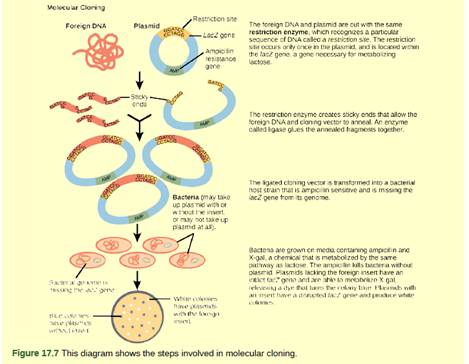
Concept explainers
Figure 17.7 You are working in a molecular biology lab and, unbeknownst to you, your lab partner left the foreign genomic DNA that you are planning to clone on the lab bench overnight instead of storing it in the freezer. As a result, it was degraded by nucleases, but still used in the experiment. The plasmid, on the other hand, is fine. What results would you expect from your molecular cloning experiment?
- There will be no colonies on the bacterial plate.

Introduction:
Molecular cloning is a process to reproduce desired fragments of the genome. In cloning the plasmid molecules can be used to provide a folder in which desired genomic fragment is inserted. Then plasmids are introduced into a bacterial host. Plasmids with foreign DNA into them are called recombinant DNA molecules.
Answer to Problem 1VCQ
Correct answer:
The correct answer is option (b)- there will be blue colony only.
Explanation of Solution
Explanation for the correct answer:
Option (b) is given as ‘there will be blue colony only’. In this experiment, when the cloning vector plasmid with degraded foreign DNA is transformed into a bacterial host strain, releases a dye which turns the colony blue. Therefore, option (b) is correct.
Explanation for incorrect answers:
Option (a) is given as ‘there will be no colonies on the bacterial plate’. The colonies will be present on the plate. So, it is a wrong answer.
Option (c) is given as ‘there will be blue and white colonies no colonies’. Both blue and white colonies are only possible when plasmids are with foreign DNA insert and without insert.
So, it is a wrong answer.
Option (d) given as ‘there will be white colony only’. White colonies are not possible as plasmids with insert are not capable to express their characters. So, it is a wrong answer.
Hence, options (a ), (c), and (d) are incorrect.
The molecular cloning is a process to reproduce the desired fragments of the genome is reproduced by molecular cloning with the help of plasmid which provides a folder in which desired genomic fragment is inserted. Hence, the correct answer is option (b).
Want to see more full solutions like this?
Chapter 17 Solutions
Biology 2e
Additional Science Textbook Solutions
Campbell Biology in Focus (2nd Edition)
Microbiology: An Introduction
Microbiology with Diseases by Body System (5th Edition)
Anatomy & Physiology (6th Edition)
Campbell Biology: Concepts & Connections (9th Edition)
Concepts of Genetics (12th Edition)
- What is behavioral adaptarrow_forward22. Which of the following mutant proteins is expected to have a dominant negative effect when over- expressed in normal cells? a. mutant PI3-kinase that lacks the SH2 domain but retains the kinase function b. mutant Grb2 protein that cannot bind to RTK c. mutant RTK that lacks the extracellular domain d. mutant PDK that has the PH domain but lost the kinase function e. all of the abovearrow_forwardWhat is the label ?arrow_forward
- Can you described the image? Can you explain the question as well their answer and how to get to an answer to an problem like this?arrow_forwardglg 112 mid unit assignment Identifying melting processesarrow_forwardGive only the mode of inheritance consistent with all three pedigrees and only two reasons that support this, nothing more, (it shouldn't take too long)arrow_forward
- Oarrow_forwardDescribe the principle of homeostasis.arrow_forwardExplain how the hormones of the glands listed below travel around the body to target organs and tissues : Pituitary gland Hypothalamus Thyroid Parathyroid Adrenal Pineal Pancreas(islets of langerhans) Gonads (testes and ovaries) Placentaarrow_forward
 Human Heredity: Principles and Issues (MindTap Co...BiologyISBN:9781305251052Author:Michael CummingsPublisher:Cengage Learning
Human Heredity: Principles and Issues (MindTap Co...BiologyISBN:9781305251052Author:Michael CummingsPublisher:Cengage Learning Biology 2eBiologyISBN:9781947172517Author:Matthew Douglas, Jung Choi, Mary Ann ClarkPublisher:OpenStax
Biology 2eBiologyISBN:9781947172517Author:Matthew Douglas, Jung Choi, Mary Ann ClarkPublisher:OpenStax Biology Today and Tomorrow without Physiology (Mi...BiologyISBN:9781305117396Author:Cecie Starr, Christine Evers, Lisa StarrPublisher:Cengage Learning
Biology Today and Tomorrow without Physiology (Mi...BiologyISBN:9781305117396Author:Cecie Starr, Christine Evers, Lisa StarrPublisher:Cengage Learning Concepts of BiologyBiologyISBN:9781938168116Author:Samantha Fowler, Rebecca Roush, James WisePublisher:OpenStax College
Concepts of BiologyBiologyISBN:9781938168116Author:Samantha Fowler, Rebecca Roush, James WisePublisher:OpenStax College Biology: The Dynamic Science (MindTap Course List)BiologyISBN:9781305389892Author:Peter J. Russell, Paul E. Hertz, Beverly McMillanPublisher:Cengage Learning
Biology: The Dynamic Science (MindTap Course List)BiologyISBN:9781305389892Author:Peter J. Russell, Paul E. Hertz, Beverly McMillanPublisher:Cengage Learning BiochemistryBiochemistryISBN:9781305577206Author:Reginald H. Garrett, Charles M. GrishamPublisher:Cengage Learning
BiochemistryBiochemistryISBN:9781305577206Author:Reginald H. Garrett, Charles M. GrishamPublisher:Cengage Learning





